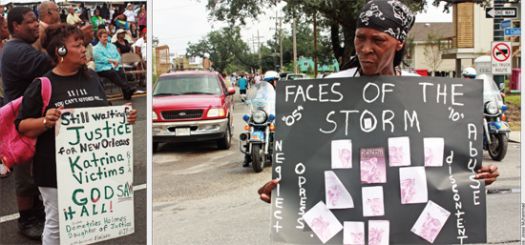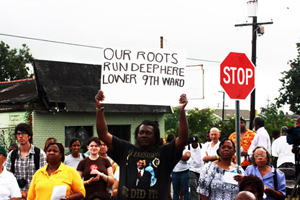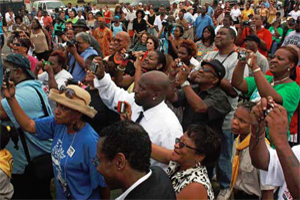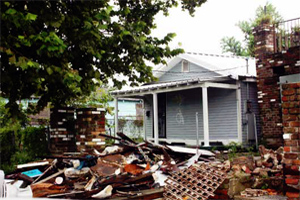
With hurricane anniversary comes stories of startling lack of
progress in New Orleans
NEW ORLEANS (FinalCall.com) – While driving through the Lower Ninth Ward of the city, visitors might be shocked to see that most of it still looks the same as it did when the floodwaters of Hurricane Katrina struck–five years ago.
This is where Linda Smith grew up, lost her entire home and eventually rebuilt. She sits on her porch reflecting on and sharing the psychological weight she has carried for half a decade.

“I will never forget the day I returned here and saw that my home was completely washed away. It has been hard to get that image out of my head. I think about it beyond this annual anniversary. I reflect on all of the people who won’t be back,” Ms. Smith told The Final Call.
Despite being surrounded by vacant weeded lots, mildewed homes and a depleted population, Ms. Smith is happy she finally returned last year after evacuating to multiple cities with family members.
She was able to secure funding from the state’s Road Home program to build a newer and bigger home on her lot but warns outsiders that the healing process is nowhere near done.
“There is not just a need to mark the anniversary. There is still a need for people to come back. There is still a need for people to get money. I usually walk my neighborhood early in the morning and it is ridiculous how they did the Ninth Ward. Most of the other areas are coming back up but the Ninth Ward is always forgotten,” she said.
The landfall wrath of Hurricane Katrina coupled with the breaching of the levees on August 29, 2005 caused hundreds of thousands to be displaced throughout the country and claimed the lives of over 1,400 people. Over $1 billion in damages hit Louisiana and Mississippi as images of floating dead bodies, crying babies, torn homes, and stranded citizens screaming for help drew world attention to the Gulf Coast.
Gail Menville and her family live around the corner from Ms. Smith in the Lower Ninth Ward. Their home was washed away. They lived in Texas for two years and even stayed in a trailer. Her home was only recognizable by the remaining front steps and the alarm system.
“Every time I came here to Claiborne Street I started crying because it was … excuse me, but it is just so hard to even talk about it,” she told The Final Call as tears flowed from her eyes.
Prior to Katrina, Ms. Menville ran her own daycare center but due to depression after the storm she could not muster up the strength to restart the business. She now works at a local Walmart, has rebuilt her home yet still can’t help being afraid every time it rains.
“I am always ready to leave when it starts storming because the fear still lingers. It’s just extremely sad to be here and sometimes I just want to pack up and leave. I’m sticking it out for my family,” she said.

Being angry and depressed is an understatement for 60-year-old Deborah Duplessis-Cola, who went from being a working class homeowner to now having her belongings cramped into a one-bedroom apartment on Congress Drive in the Gentilly area.
“I am holding back tears because I have cried enough. This mental anguish has given me high blood pressure and a skin disorder. I’m still suffering the aftermath. I’m sleeping between a kitchen and living room on an air mattress now,” Ms. Duplessis-Cola said.
Her home took in over 12 feet of floodwater. She evacuated with her 92-year-old father, whom she still cares for. They lived in Dallas, Houston, Baton Rouge, and Slidell, La., before returning to the Crescent City. Her insurance claim allowed her to pay her home loan off. After a long battle, she was able to secure funds from the Small Business Administration and the Road Home program to get a new home built. However, more troubles occurred.
“I hired a contractor to repair the home and they committed fraud. They walked away with my money. I reported it to the state contractor’s board and I haven’t received compensation yet. Plus I don’t qualify for no other assistance,” said Ms. Duplessis-Cola, who works as a medical certification assistant.
As part of the Katrina commemoration, President Barack Obama delivered a national address from the campus of Xavier University to reiterate his administration’s commitment to the Gulf.
“Now, I don’t have to tell you that there are still too many vacant and overgrown lots.There are still too many students attending classes in trailers.There are still too many people unable to find work.And there are still too many New Orleanians, folks who haven’t been able to come home.So while an incredible amount of progress has been made, on this fifth anniversary, I wanted to come here and tell the people of this city directly: My administration is going to stand with you–and fight alongside you–until the job is done,” said President Obama on Aug. 29.
Like other struggling survivors, Ms. Duplessis-Cola wasn’t just interested in hearing good words–she wants action and personal help now.
“I wanted to hand deliver my documents to the president so he can read for himself the real life horror stories that’s still going on since 2005. I need help! Since that contractor’s theft, I have not been able to get on my feet. I am paying rent, a house note, utilities, and storages fees on three bins. If one more thing goes wrong, I could lose everything,” said Ms. Duplessis-Cola.
Measuring Katrina’s pain
In his annual Katrina Pain Index, Loyola Professor Bill Quigley gives a statistical picture of the state of New Orleans and the work that remains to bring the city all the way back.
Louisiana residents are located in more than 5,500 cities across the nation, the largest concentrations being in Houston, Dallas, Atlanta and San Antonio. An estimated 141,000 fewer people live in the metro New Orleans area. Women lead the majority of those displaced at 59 percent compared to 41 percent men. A third of those displaced earn less than $20,000 a year.
According to the Greater New Orleans Community Data Center, at least 1 in 4 residential addresses in New Orleans are vacant or blighted.

The Road Home program’s rebuilding grants for homeowners on average fell approximately $35,000 short of the money needed to rebuild–particularly in the Black communities hardest hit by Katrina. Nearly 20,000 applicants for rebuilding homes that are eligible for funding have received nothing. In a 2008 lawsuit a judge concluded “on average, African-American homeowners received awards that fell farther short of the cost of repairing their homes than did White recipients.”
Mtangulizi Sanyika of the African-American Leadership Project told The Final Call, “This is the tale of two cities. We have the driest parts of the city that didn’t get much damage. They look like they are recovering. The most devastated neighborhoods, such as the Lower Ninth Ward have not recovered. There’s not one school in this area, no hospital and the infrastructure is still underdeveloped,” he said.
“The Lower Ninth Ward should have been the number one priority because we sustained the greatest amount of damage,” New Orleans Councilmember Jon Johnson said at community housing panel at Claffin Avenue Seventh-Day Adventist Church on Aug. 27.
“Where did the money go? We’re still hearing the same promises but the people continue to suffer,” said Ruby Sumler, at the same forum, filled with concerned residents fed up with words.
“The Lower Ninth was the poster child of Katrina but you can see no evidence of any of the money donated coming to this community. That concerns me,” said Councilmember Johnson, who oversees District E which includes the Lower Ninth Ward.
The Southern Education Foundation reported that the number of students in public schools in New Orleans, which are over 90 percent Black, has declined by 43 percent since Katrina.
“There are still many inequities that must be addressed including full recovery and restoration for all of our public school teachers who were fired after the storm. There needs to be compensation for them and a dramatic redesign of the Road Home program. Give them the money they deserve,” former New Orleans Councilmember Cynthia Willard Lewis told The Final Call.
On Aug. 28, FEMA announced it will award the Orleans Parish School Board and the Recovery School District a lump settlement of $1.8 billion for damages suffered during Katrina.
“It was a battle worth waging and while we would have liked to have received the money sooner, it was worth the wait,” said Senator Mary L. Landrieu (D-La.).
Her brother and newly elected Mayor Mitch Landrieu said, “This settlement is a big win for the children of New Orleans. Katrina destroyed or damaged 127 of our schools, and for too long our children have been learning in temporary, unsatisfactory buildings. This has been a long process and is years in the making.”
“Black New Orleans has not returned. People have gotten Katrina fatigue and have forgotten us,” said Mr. Sanyika.
The city’s Black population has fallen, homelessness and unemployment remain problems and there have been steep rent increases, not to mention a group of police officers charged with involvement in a fatal shooting of unarmed civilians and covering up the alleged crimes.
Survivor: ‘We own our future’
For several weeks, various political leaders and grassroots groups hosted events throughout the city to commemorate the anniversary. California lawmaker Maxine Waters delivered a message before hundreds on Aug. 29 in the Lower Ninth Ward a few feet from the Katrina Monument.
“I feel the same way today that I felt five years ago when I visited this area after the storm. I am disappointed,” said Rep. Waters.
Local music artist Sess 4-5 and Rev. Lennox Yearwood of the Hip Hop Caucus led the annual Katrina Commemoration Foundation’s March and Secondline through the streets of the Lower Ninth Ward.
“We’re here to remember but also to push forward on the injustice that was done five years ago and the injustice that is still going on today,” Rev. Yearwood said.
Jaribu Hill, director of the Mississippi Workers’ Center, traveled from the Delta to participate in the march. “The spotlight is still on the U.S. government for failing to take care of its citizens. There are still millions who are in a posture of displacement. This is a human rights violations sponsored by the richest country in the world,” she told The Final Call.
“Realistically when we look around we know we’re not stable. But I do feel a sense of encouragement because we’re taking the lead role in recovering our own neighborhood,” Patricia Jones said.
Mrs. Jones, who also lost her home, is the executive director of the Lower Ninth Ward Neighborhood Network Association. The group is actively involved in helping residents return, rebuild and restore their pre-Katrina livelihoods.
“At the end of the day, we own our own future. As a community we have to take the lead because no one else is going to care if we don’t. We need action. If you come here don’t just be in awe–help us. We know we’re hurting. We’re living it,” said Mrs. Jones.
Related news:
FCN Documentary: The Unmasking of New Orleans
Reconstructing Our Selves Our Lives and Our Communities (FCN/Minister Farrakhan, 08-22-2007)
More NOPD officers charged in post-Katrina shooting death, cover-up (FCN, 07-01-2010)
Second ex-cop pleads guilty to covering up deadly New Orleans shooting (FCN, 03-24-2010)
A victory for Katrina flood survivors? (FCN, 11-25-2009)
Katrina fatigue and hurricane’s forgotten victims (FCN, 08-26-2009)
Hurricane victims forgotten? (FCN, 04-18-2009)
In Katrina aftermath, White vigilantes shot at Blacks on sight (FCN, 01-07-2009)
The Gulf Coast: Forgotten, ignored and struggling (FCN, 10-22-2008)
Study: Gov’t violated rights, principles in Katrina failures (FCN, 01-28-2008)
Post-Katrina survival: The struggle continues (FCN, 08-04-2006)
The hidden story in New Orleans (FCN, 01-25-2006)












